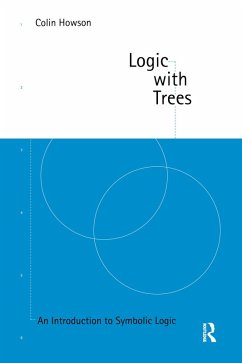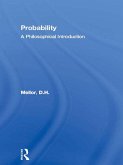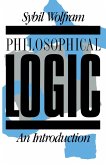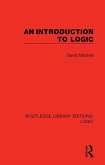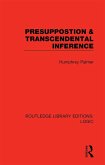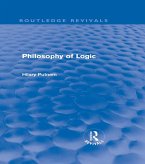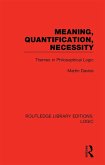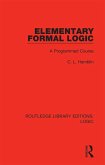45,95 €
45,95 €
inkl. MwSt.
Sofort per Download lieferbar

23 °P sammeln
45,95 €
Als Download kaufen

45,95 €
inkl. MwSt.
Sofort per Download lieferbar

23 °P sammeln
Jetzt verschenken
Alle Infos zum eBook verschenken
45,95 €
inkl. MwSt.
Sofort per Download lieferbar
Alle Infos zum eBook verschenken

23 °P sammeln
- Format: ePub
- Merkliste
- Auf die Merkliste
- Bewerten Bewerten
- Teilen
- Produkt teilen
- Produkterinnerung
- Produkterinnerung

Bitte loggen Sie sich zunächst in Ihr Kundenkonto ein oder registrieren Sie sich bei
bücher.de, um das eBook-Abo tolino select nutzen zu können.
Hier können Sie sich einloggen
Hier können Sie sich einloggen
Sie sind bereits eingeloggt. Klicken Sie auf 2. tolino select Abo, um fortzufahren.

Bitte loggen Sie sich zunächst in Ihr Kundenkonto ein oder registrieren Sie sich bei bücher.de, um das eBook-Abo tolino select nutzen zu können.
First published in 1997. Routledge is an imprint of Taylor & Francis, an informa company.
- Geräte: eReader
- mit Kopierschutz
- eBook Hilfe
- Größe: 2.91MB
Andere Kunden interessierten sich auch für
![Probability (eBook, ePUB) Probability (eBook, ePUB)]() D. H. MellorProbability (eBook, ePUB)38,95 €
D. H. MellorProbability (eBook, ePUB)38,95 €![Philosophical Logic (eBook, ePUB) Philosophical Logic (eBook, ePUB)]() Sybil WolframPhilosophical Logic (eBook, ePUB)54,95 €
Sybil WolframPhilosophical Logic (eBook, ePUB)54,95 €![An Introduction to Logic (eBook, ePUB) An Introduction to Logic (eBook, ePUB)]() David MitchellAn Introduction to Logic (eBook, ePUB)34,95 €
David MitchellAn Introduction to Logic (eBook, ePUB)34,95 €![Presuppostion & Transcendental Inference (eBook, ePUB) Presuppostion & Transcendental Inference (eBook, ePUB)]() Humphrey PalmerPresuppostion & Transcendental Inference (eBook, ePUB)23,95 €
Humphrey PalmerPresuppostion & Transcendental Inference (eBook, ePUB)23,95 €![Philosophy of Logic (Routledge Revivals) (eBook, ePUB) Philosophy of Logic (Routledge Revivals) (eBook, ePUB)]() Hilary PutnamPhilosophy of Logic (Routledge Revivals) (eBook, ePUB)46,95 €
Hilary PutnamPhilosophy of Logic (Routledge Revivals) (eBook, ePUB)46,95 €![Meaning, Quantification, Necessity (eBook, ePUB) Meaning, Quantification, Necessity (eBook, ePUB)]() Martin DaviesMeaning, Quantification, Necessity (eBook, ePUB)34,95 €
Martin DaviesMeaning, Quantification, Necessity (eBook, ePUB)34,95 €![Elementary Formal Logic (eBook, ePUB) Elementary Formal Logic (eBook, ePUB)]() C. L. HamblinElementary Formal Logic (eBook, ePUB)34,95 €
C. L. HamblinElementary Formal Logic (eBook, ePUB)34,95 €-
-
-
First published in 1997. Routledge is an imprint of Taylor & Francis, an informa company.
Dieser Download kann aus rechtlichen Gründen nur mit Rechnungsadresse in A, B, BG, CY, CZ, D, DK, EW, E, FIN, F, GR, HR, H, IRL, I, LT, L, LR, M, NL, PL, P, R, S, SLO, SK ausgeliefert werden.
Produktdetails
- Produktdetails
- Verlag: Taylor & Francis eBooks
- Seitenzahl: 212
- Erscheinungstermin: 11. Oktober 2005
- Englisch
- ISBN-13: 9781134785506
- Artikelnr.: 42710482
- Verlag: Taylor & Francis eBooks
- Seitenzahl: 212
- Erscheinungstermin: 11. Oktober 2005
- Englisch
- ISBN-13: 9781134785506
- Artikelnr.: 42710482
- Herstellerkennzeichnung Die Herstellerinformationen sind derzeit nicht verfügbar.
Howson, Colin
Introduction. Part 1: Truth-Functional Logic Chapter 1. The Basics 1.
Deductively Valid Inference 2. Syntax: Connectives and the Principle of
Composition 3. Semantics: Truth-Functionality 4. Negation and Conjunction
5. Disjunction 6. Truth-Functional Equivalence 7. The Conditional 8. Some
Other Connectives, and the Biconditional Chapter 2. Truth Trees 1.
Truth-Functionally Valid Inference 2. Conjugate Tree Diagrams 3. Truth
Trees 4. Tautologies and Contradictions Chapter 3. Propositional Languages
1. Propositional Languages 2. Object Language and Metalanguage 3. Ancestral
Trees 4. An Induction Principle 5. Multiple Conjunctions and Disjunctions
6. The Disjunctive Normal Form Theorem 7. Adequate Sets of Connectives 8.
The Duality Principle 9. Conjunctive Normal Forms Chapter 4. Soundness and
Completeness 1. The Standard Propositional Language 2. Truth Trees Again 3.
Truth-Functional Consistency, Truth-Functionally Valid Inferences, and
Trees 4. Soundness and Completeness Part 2: First Order Logic Chapter 5.
Introduction 1. Some Non-Truth-Functional Inferences 2. Quantifiers and
Variables 3. Relations 4. Formalising English Sentences Chapter 6. First
Languages: Syntax and Two More Trees Rules 1. First Order Languages 2. Two
More Tree Rules 3. Tree Proofs Chapter 7. First Order Languages: Semantics
1. Interpretations 2. Formulas and Truth 3. The Tree Rules Revisited 4.
Consistency and Validity 5. Logical Truth and Logical Equivalence Chapter
8. Soundness and Completeness 1. Applying the Tree Rules 2. Branch Models
3. Soundness and Completeness Theorems 4. Compactness Chapter 9. Identity
1. Identity 2. Tree Rules For Identity 3. Some Arithmetic 4. Functions and
Function Symbols 5. Working with Equations 6. Is Identity Part of Logic?
Chapter 10. Alternative Deductive Systems for First Order Logic 1.
Introduction 2. H 3 ND 4. Comparisons 5. Intuitionism Chapter 11. First
Order Theories 1. First Order Theories 2. Infinite Cardinals 3.
Lowenheim-Skolem Theorems 4. Second O
Deductively Valid Inference 2. Syntax: Connectives and the Principle of
Composition 3. Semantics: Truth-Functionality 4. Negation and Conjunction
5. Disjunction 6. Truth-Functional Equivalence 7. The Conditional 8. Some
Other Connectives, and the Biconditional Chapter 2. Truth Trees 1.
Truth-Functionally Valid Inference 2. Conjugate Tree Diagrams 3. Truth
Trees 4. Tautologies and Contradictions Chapter 3. Propositional Languages
1. Propositional Languages 2. Object Language and Metalanguage 3. Ancestral
Trees 4. An Induction Principle 5. Multiple Conjunctions and Disjunctions
6. The Disjunctive Normal Form Theorem 7. Adequate Sets of Connectives 8.
The Duality Principle 9. Conjunctive Normal Forms Chapter 4. Soundness and
Completeness 1. The Standard Propositional Language 2. Truth Trees Again 3.
Truth-Functional Consistency, Truth-Functionally Valid Inferences, and
Trees 4. Soundness and Completeness Part 2: First Order Logic Chapter 5.
Introduction 1. Some Non-Truth-Functional Inferences 2. Quantifiers and
Variables 3. Relations 4. Formalising English Sentences Chapter 6. First
Languages: Syntax and Two More Trees Rules 1. First Order Languages 2. Two
More Tree Rules 3. Tree Proofs Chapter 7. First Order Languages: Semantics
1. Interpretations 2. Formulas and Truth 3. The Tree Rules Revisited 4.
Consistency and Validity 5. Logical Truth and Logical Equivalence Chapter
8. Soundness and Completeness 1. Applying the Tree Rules 2. Branch Models
3. Soundness and Completeness Theorems 4. Compactness Chapter 9. Identity
1. Identity 2. Tree Rules For Identity 3. Some Arithmetic 4. Functions and
Function Symbols 5. Working with Equations 6. Is Identity Part of Logic?
Chapter 10. Alternative Deductive Systems for First Order Logic 1.
Introduction 2. H 3 ND 4. Comparisons 5. Intuitionism Chapter 11. First
Order Theories 1. First Order Theories 2. Infinite Cardinals 3.
Lowenheim-Skolem Theorems 4. Second O
Introduction. Part 1: Truth-Functional Logic Chapter 1. The Basics 1.
Deductively Valid Inference 2. Syntax: Connectives and the Principle of
Composition 3. Semantics: Truth-Functionality 4. Negation and Conjunction
5. Disjunction 6. Truth-Functional Equivalence 7. The Conditional 8. Some
Other Connectives, and the Biconditional Chapter 2. Truth Trees 1.
Truth-Functionally Valid Inference 2. Conjugate Tree Diagrams 3. Truth
Trees 4. Tautologies and Contradictions Chapter 3. Propositional Languages
1. Propositional Languages 2. Object Language and Metalanguage 3. Ancestral
Trees 4. An Induction Principle 5. Multiple Conjunctions and Disjunctions
6. The Disjunctive Normal Form Theorem 7. Adequate Sets of Connectives 8.
The Duality Principle 9. Conjunctive Normal Forms Chapter 4. Soundness and
Completeness 1. The Standard Propositional Language 2. Truth Trees Again 3.
Truth-Functional Consistency, Truth-Functionally Valid Inferences, and
Trees 4. Soundness and Completeness Part 2: First Order Logic Chapter 5.
Introduction 1. Some Non-Truth-Functional Inferences 2. Quantifiers and
Variables 3. Relations 4. Formalising English Sentences Chapter 6. First
Languages: Syntax and Two More Trees Rules 1. First Order Languages 2. Two
More Tree Rules 3. Tree Proofs Chapter 7. First Order Languages: Semantics
1. Interpretations 2. Formulas and Truth 3. The Tree Rules Revisited 4.
Consistency and Validity 5. Logical Truth and Logical Equivalence Chapter
8. Soundness and Completeness 1. Applying the Tree Rules 2. Branch Models
3. Soundness and Completeness Theorems 4. Compactness Chapter 9. Identity
1. Identity 2. Tree Rules For Identity 3. Some Arithmetic 4. Functions and
Function Symbols 5. Working with Equations 6. Is Identity Part of Logic?
Chapter 10. Alternative Deductive Systems for First Order Logic 1.
Introduction 2. H 3 ND 4. Comparisons 5. Intuitionism Chapter 11. First
Order Theories 1. First Order Theories 2. Infinite Cardinals 3.
Lowenheim-Skolem Theorems 4. Second O
Deductively Valid Inference 2. Syntax: Connectives and the Principle of
Composition 3. Semantics: Truth-Functionality 4. Negation and Conjunction
5. Disjunction 6. Truth-Functional Equivalence 7. The Conditional 8. Some
Other Connectives, and the Biconditional Chapter 2. Truth Trees 1.
Truth-Functionally Valid Inference 2. Conjugate Tree Diagrams 3. Truth
Trees 4. Tautologies and Contradictions Chapter 3. Propositional Languages
1. Propositional Languages 2. Object Language and Metalanguage 3. Ancestral
Trees 4. An Induction Principle 5. Multiple Conjunctions and Disjunctions
6. The Disjunctive Normal Form Theorem 7. Adequate Sets of Connectives 8.
The Duality Principle 9. Conjunctive Normal Forms Chapter 4. Soundness and
Completeness 1. The Standard Propositional Language 2. Truth Trees Again 3.
Truth-Functional Consistency, Truth-Functionally Valid Inferences, and
Trees 4. Soundness and Completeness Part 2: First Order Logic Chapter 5.
Introduction 1. Some Non-Truth-Functional Inferences 2. Quantifiers and
Variables 3. Relations 4. Formalising English Sentences Chapter 6. First
Languages: Syntax and Two More Trees Rules 1. First Order Languages 2. Two
More Tree Rules 3. Tree Proofs Chapter 7. First Order Languages: Semantics
1. Interpretations 2. Formulas and Truth 3. The Tree Rules Revisited 4.
Consistency and Validity 5. Logical Truth and Logical Equivalence Chapter
8. Soundness and Completeness 1. Applying the Tree Rules 2. Branch Models
3. Soundness and Completeness Theorems 4. Compactness Chapter 9. Identity
1. Identity 2. Tree Rules For Identity 3. Some Arithmetic 4. Functions and
Function Symbols 5. Working with Equations 6. Is Identity Part of Logic?
Chapter 10. Alternative Deductive Systems for First Order Logic 1.
Introduction 2. H 3 ND 4. Comparisons 5. Intuitionism Chapter 11. First
Order Theories 1. First Order Theories 2. Infinite Cardinals 3.
Lowenheim-Skolem Theorems 4. Second O
